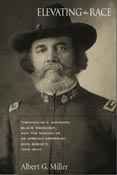Elevating the Race
Theophilus G. Steward, Black Theology, and the Making of an African American Civil Religion, 1865-1924

As a minister in the African Methodist Episcopal Church, an army chaplain, a college professor, and a prolific writer, Theophilus Gould Steward was one of America’s leading black intellectuals during the half-century following Emancipation. He was not only a theologiandeeply committed to challenging his church’s outlook, he also epitomized postbellum efforts to create an African American civil society through religious, educational, and social institutions integral to citizenship.
Steward actively constructed a theological discourse that challenged both black and white religious and secular institutions, yet his tenacious pursuit of high standards often led him into conflict with the very community he served. A. G. Miller takes a new look at thiskey figure in African American history to establish Steward’s place among the most influential thinkers and activists of the late nineteenth century. Augmenting what is already known about Steward’s life with a thoughtful combination of intellectual and social history, Miller presents Steward’s ideas within the context of the social, political, economic, and religious trends of his day.
Miller examines Steward’s accomplishments and writings—including his unpublished manuscripts and his overlooked Victorian novel—to assess the ideas that he left to posterity and to consider how they shaped his times. The book devotes individual chapters to the key themes that dominated Steward’s life: African American education, reconciling theology with modern science, the intersection of rational theology and moral virtues, the contradictions of race, the role of women in African American civil society, and Steward’s views on the military and imperialism.
With great insight and clarity, Miller discloses in a new and original way the rich life and thought of this extraordinary man. His study is both a groundbreaking analysis of Steward’s legacy and an important contribution to the history of American religious thought.
The Author: A. G. Miller is assistant professor of religion and Nord Faculty Fellow at Oberlin College and an ordained minister in the Pentecostal Church.
